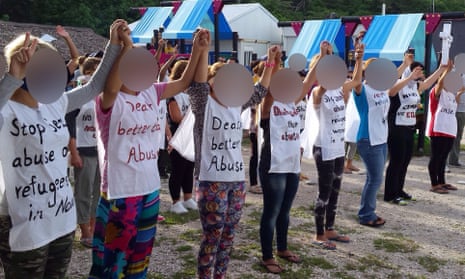The immigration minister, Peter Dutton, has said resettling women and child refugees from Nauru was a matter of “first priority” for his government but has not nominated a third country to where they might go.
With the Nauru detention centre mired in controversy over reports of sexual predation, physical violence, and self-harm, and Nauru resolutely refusing to allow people to settle permanently, Australia has sought a “third country” resettlement for refugees on the island for more than three years without success.
One Rohingyan refugee has been resettled from Nauru in Cambodia at a cost to Australia of more than $40m, and two refugees with family members in Canada have moved there.
New Zealand has made a standing offer to resettle 150 refugees a year from Australia’s offshore detention camps, but this has been rejected by Australia because it would be seen as giving people access to Australia. The government’s declared policy is that no person from offshore detention will ever be allowed to settle in Australia.
Speaking to Sky News in New York on the sidelines of a UN-sponsored international summit on migrants and refugees, Dutton said finding a resettlement country for the women and child refugees on Nauru – many of whom have been on the island for more than three years – was a key goal for government.
“Be assured the government wants to get particularly women and children out as a first priority from Nauru – we’re working on that.”
However, Dutton declined to nominate a third country where people might be able to be resettled.
“We’re working with third countries to see what settlement options might be available.
“We’ve had discussions over a long period of time with partners and I’ve not commented, not ruled countries in or out.”
In a speech to the Australian Strategic Policy Institute last week, Dutton said Australia would maintain its offshore processing network and its “relationship in this regard with Nauru will continue for decades”.
Last month the Guardian published the Nauru Files, more than 2,000 leaked incident reports from the island which included details of systemic sexual and physical violence against refugees and asylum seekers, privation and degrading treatment and epidemic rates of self-harm and suicide attempts.
Further disclosures this week show sexual abuse and self-harm continuing.
In New York Dutton reiterated the comments of the prime minister, Malcolm Turnbull, arguing Australia’s asylum policies were an example to the world in dealing with irregular migration.
“We have a good story to tell in Australia, we have been able to secure our borders and at the same time we’ve been able to bring a record number of refugees in through the right way.”
“We are an island nation so we have the benefit of not having borders which are porous and that’s the problem in Europe, trying to enforce those land crossing and regularise those crossing is difficult … but nonetheless people seek to make the voyage across water in Australia, as they do across the Mediterranean to Europe so there are lots of lessons that can be learnt and I think people are very interested in the success we’ve had in securing our borders.”
Australia’s current refugee intake is 13,750 a year (rising to 18,750 in three years)and it committed in September last year to taking 12,000 additional refugees from Syria, and Iraq over an unspecified period, about 3,500 of whom have arrived in the year since.
In 1980-81 Malcolm Fraser’s Coalition government accepted 22,545 humanitarian entrants. In 2012-13 the Gillard Labor government accepted 20,019.
Australia, an island nation distant from major refugee-producing conflicts, has experienced a fraction of the irregular migration of other parts of the world.
At the peak of boat arrivals to Australia, 20,587 arrived in a single year, 2013, a figure surpassed in Europe in some single weeks. Europe in 2015 received 1.26 million people seeking asylum.
At the New York summit Australia’s asylum regime has been criticised as setting a dangerous precedent. Boat turn-backs, offshore processing and regional resettlement were singled out.
The British-based Overseas Development Institute accused Australia of leading a “race to the bottom on refugee protection”. The country’s hardline policies of refusing entry and protection being adopted by countries in Europe and even countries in regions of the world traditionally receptive to refugees.
ODI cited the examples of Jordan refusing to welcome 70,000 Syrians stranded in the desert area of Berm and Kenya’s plans to shut the long-running Dadaab refugee camp and repatriate its largely-Somali refugee population.
“We are seeing a worrying race to the bottom on refugee protection around the world,” the ODI’s Sara Pantuliano, author of the report, said in a statement.
“If wealthy countries with strong economies are refusing to meet their obligations under the 1951 Refugee Convention, what incentive is there for poorer countries to do so?”
“High-income countries must reverse this dangerous trajectory and instead take meaningful steps towards the protection of some of the world’s most vulnerable people.”
Oxfam Australia’s chief executive, Helen Szoke, accused the Australian government “wasting time and grandstanding” about the benefits of tough border protection.
She said numerous reports had shown Australia’s offshore detention regime was dysfunctional, expensive and condemned by the international community.
“We are continuing to see heart wrenching reports of sexual abuse and assault, self-harm and hopelessness of refugees detained on Nauru and Manus Island with over 2,000 people left to languish in detention,” Szoke said.
“Last week’s report by the Australian National Audit Office put the cost of Australia’s offshore detention program at almost $600,000 per person every year and another recent study by Unicef and Save the Children estimated the cost of offshore detention at $9.6bn over three years. The extraordinary cost of offshore detention has not rated a mention in the government’s commentary.”
